Related Research Articles
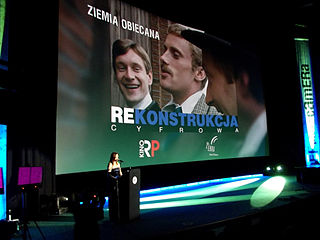
The history of cinema in Poland is almost as long as the history of cinematography, and it has universally recognized achievements, even though Polish films tend to be less commercially available than films from several other European nations.

Passenger is a 1963 Polish feature film directed by Andrzej Munk. When Munk died in a car crash during production, the unfinished film was assembled for release by directors Witold Lesiewicz and Andrzej Brzozowski.

Jerzy Skolimowski is a Polish film director, screenwriter, dramatist, actor and painter. Beginning as a screenwriter for Andrzej Wajda's Innocent Sorcerers (1960), Skolimowski has made more than twenty films since his directorial debut The Menacing Eye (1960). In 1967 he was awarded the Golden Bear prize for his Belgian film The Departure (1967). Among his other notable films is Deep End (1970), starring Jane Asher and John Moulder Brown.

The Leon Schiller Polish National Film, Television and Theatre School in Łódź, commonly known as Łódź Film School is a Polish academy for future actors, directors, photographers, camera operators and television staff. It was founded on 8 March 1948 in Łódź (Lodz).
Paweł Jan Mykietyn is a Polish award-winning composer and clarinetist.
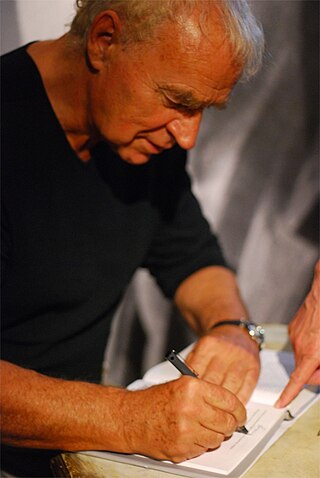
Janusz Andrzej Głowacki, better known as Janusz Głowacki or colloquially simply as Głowa, was a Polish playwright, essayist and screenwriter. Głowacki was the recipient of multiple awards and honours, including Guggenheim Fellowship, two Nike Award nominations and BAFTA Award nomination. He was awarded the Gloria Artis Gold Medal in 2005 for his contribution to Polish culture, and in 2014, the Commander's Cross of the Order of Polonia Restituta.

Korczak is a 1990 black-and-white biographical war film directed by Andrzej Wajda and written by Agnieszka Holland, about Polish-Jewish humanitarian Janusz Korczak. An international co-production between Poland, Germany and the United Kingdom, it stars Wojciech Pszoniak as Korczak, with Ewa Dałkowska, Teresa Budzisz-Krzyzanowska, Marzena Trybala, Piotr Kozlowski, Zbigniew Zamachowski and Jan Peszek.
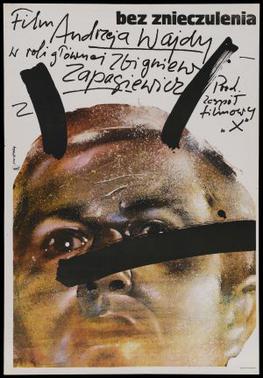
Without Anesthesia is the English-language title for the Polish film Bez znieczulenia, released in 1978, directed by Andrzej Wajda. It was entered in the 1979 Cannes Film Festival.

How I Unleashed World War II is a 1970 Polish comedy film directed by Tadeusz Chmielewski and based on Kazimierz Sławiński's novel "Przygody kanoniera Dolasa". It was shot in Sochi, Baku, Poświętne and Łódź, among other places.

Katyń is a 2007 Polish historical drama film about the 1940 Katyn massacre, directed by Academy Honorary Award winner Andrzej Wajda. It is based on the book Post Mortem: The Story of Katyn by Andrzej Mularczyk. It was nominated for Best Foreign Language Film for the 80th Academy Awards.

Nights and Days is a 1975 Polish film directed by Jerzy Antczak. This epic family drama was based on Maria Dąbrowska's novel Noce i dnie, and was described by The Washington Post as "Poland's Gone With the Wind". Set in Kalisz and the Kalisz Region in the second half of the 19th century after the failure of the January Uprising in 1863, the film presents a unique portrait of an oppressed society, life in exile, and the confiscation of private property as told through the loves and struggles of the Niechcic family. This sweeping historical epic was the highest-grossing film in Poland's history upon its release and was nominated for an Academy Award for Best Foreign Language Film in 1977. The film score was composed by Waldemar Kazanecki, which includes a Viennese waltz that is frequently played at Polish weddings as the first dance of bride and groom.

Pharaoh is a 1966 epic Polish film directed by Jerzy Kawalerowicz and adapted from the eponymous novel by the Polish writer Bolesław Prus. In 1967, it was nominated for an Academy Award for Best Foreign Language Film. It was also entered into the 1966 Cannes Film Festival. It sold more than 7 million tickets in Poland, becoming one of the highest-grossing Polish films of all time. Pharaoh is among 21 digitally restored classic Polish films chosen for Martin Scorsese Presents: Masterpieces of Polish Cinema.
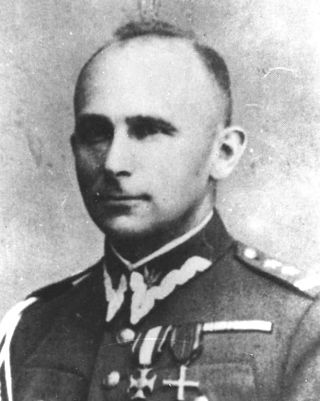
The Bureau of Information and Propaganda of the Headquarters of Związek Walki Zbrojnej, later of Armia Krajowa, a conspiracy department created in spring 1940 during the German occupation of Poland, inside the Związek Walki Zbrojnej, then of the Supreme Command of Armia Krajowa.

Over the Silver Globe is a 1988 Polish epic science fiction film directed and written by Andrzej Żuławski, adapted from The Lunar Trilogy by his grand-uncle, Jerzy Żuławski. Starring Andrzej Seweryn, Jerzy Trela, Iwona Bielska, Jan Frycz, Henryk Bista, Grażyna Deląg and Krystyna Janda, the plot follows a team of astronauts who land on an uninhabited planet and form a society. Many years later, a single astronaut is sent to the planet and becomes a messiah.

Bad Luck is a 1960 Polish black comedy film directed by Andrzej Munk. The screenplay is based on Jerzy Stawiński’s novel Six Incarnations of Jan Piszczyk (1959).
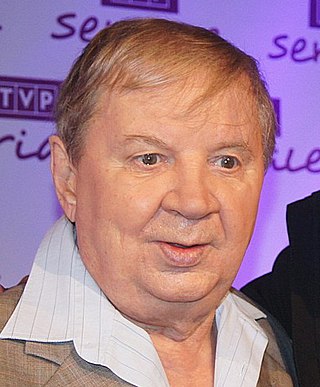
Roman Kłosowski was a Polish character actor and stage director.
Westerplatte or Westerplatte Resists is a 1967 Polish historical film directed by Stanisław Różewicz. It was entered into the 5th Moscow International Film Festival where it won a Silver Prize.
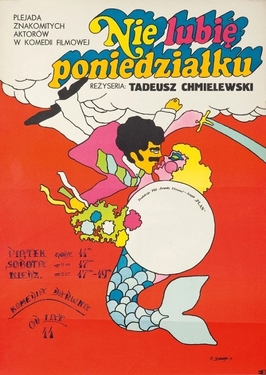
I Hate Mondays is a 1971 Polish comedy film directed by Tadeusz Chmielewski.
The Polish Film Academy is a professional honorary organization dedicated to the advancement of the arts and sciences of motion pictures.
References
- ↑ "Festival de Cannes: Unvanquished City". festival-cannes.com. Retrieved 16 January 2009.